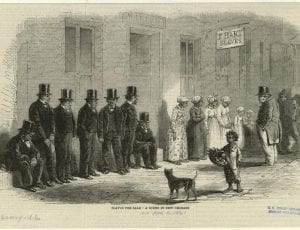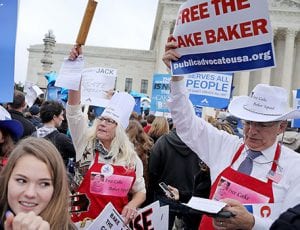 In January 2019, Representative Sheila Jackson Lee (D-Texas) introduced H.R. 40: The Commission to Study and Develop Reparations Proposals for African Americans Act.1 Reparations for slavery, Jim Crow, and systematic segregation and racism in major U.S. institutions is not a new idea, but it has never gained the type of traction that it currently has. In June, the House Judiciary Committee held hearings to begin exploring the idea.2
In January 2019, Representative Sheila Jackson Lee (D-Texas) introduced H.R. 40: The Commission to Study and Develop Reparations Proposals for African Americans Act.1 Reparations for slavery, Jim Crow, and systematic segregation and racism in major U.S. institutions is not a new idea, but it has never gained the type of traction that it currently has. In June, the House Judiciary Committee held hearings to begin exploring the idea.2
This bill would not automatically establish reparations. Instead, the bill would “establish a commission to study and consider a national apology and proposal for reparations for the institution of slavery, its subsequent de jure and de facto racial and economic discrimination against African Americans, and the impact of these forces on living African Americans, to make recommendations to the Congress on appropriate remedies.”3
WATCH: Senate Majority Leader Mitch McConnell (R-Ky.) responds to the bill
WATCH: Ta-Nehisi Coates, author of “The Case for Reparations,” testifies before the House Judiciary Subcommittee on the Constitution, Civil Rights, and Civil Liberties
Discussions about race, racism, and racial justice are becoming more central parts of our political discourse. The rising tide of white nationalism and white supremacy,4 including their increasing visibility in public spaces,5 has helped spur discussion about the legacy of racism in the United States. Movements and organizations such as Black Lives Matter and the Equal Justice Initiative, as well as publications such as Between the World and Me, The New Jim Crow, and the 1619 Project, have focused attention the legacies of slavery, Jim Crow segregation, economic exclusion, and mass incarceration.
In this social and political environment, the debate over reparations is taken more seriously—but is also more contentious—than it has been at other times.
Arguments in support of the bill:
The text of the bill contains arguments—findings—that support passage of the bill. Among those findings are:
- Approximately 4,000,000 Africans and their descendants were enslaved in the United States and colonies that became the United States from 1619 to 1865.
- The institution of slavery was constitutionally and statutorily sanctioned by the government of the United States from 1789 through 1865.
- The slavery that flourished in the United States constituted an immoral and inhumane deprivation of Africans’ life, liberty, African citizenship rights, and cultural heritage, and denied them the fruits of their own labor.
- Following the abolition of slavery, the U.S. government, at the federal, state, and local levels, continued to perpetuate, condone, and often profit from practices that continued to brutalize and disadvantage African Americans, including sharecropping, convict leasing, Jim Crow, redlining, unequal education, and disproportionate treatment at the hands of the criminal justice system.
- As a result of the historic and continued discrimination, African Americans continue to suffer debilitating economic, educational, and health hardships, including but not limited to having nearly 1,000,000 black people incarcerated; an unemployment rate more than twice the current white unemployment rate; and an average of less than 1/16th of the wealth of white families, a disparity which has worsened, not improved over time.6
Arguments opposing the bill:
- Charles Lane, a columnist for the Washington Post, argues that reparations may be unconstitutional because black people living today cannot show direct injury from slavery in the same way that other groups—such as Japanese Americans who lived through internment—have been able to do.7
- Kevin Williamson, writing in National Review, argues that reparations would not accomplish what they are intended to accomplish and that the policies that would most help African Americans, and all Americans, would be economic and educational reform aimed at creating a dynamic and growing economy.8
- Coleman Hughes, an African-American writer and student, argued against reparations before a congressional subcommittee, saying that reparations “would insult many black Americans by putting a price on the suffering of their ancestors. If we were to pay reparations today, we would only divide the country further, making it harder to build the political coalitions required to solve the problems facing black people today.”9
- Representative Mike Johnson (R-La.) has spoken of “the injustice of monetary reparations from current taxpayers for the sins of a small subset of Americans from many generations ago.”10
The debate over this issue is taking place in the primary campaigns of Democratic presidential hopefuls, and Congress will continue to consider and possibly vote on the bill.
- What do you view to be the strongest arguments for and against the idea of reparations?
- If you were a member of Congress, what more would you want to know before voting on this bill?
- Setting aside the question of reparations, do you think that establishing a commission to investigate the impacts of slavery, segregation, and systemic racism is a good idea? Why or why not?
- If you are opposed to the idea of reparations in the form of cash or a check, do you think something else should be done to address the legacy and injustice of slavery and segregation? If so, what? If no, why not?
How to Get Involved
Students can continue to follow the bill on GovTrack.
Students can weigh in—as a group assignment or individually—by visiting this page.
Students can also research their member of Congress to see which committees they sit on. If their representative sits on the Judiciary Committee, they should consider contacting that member while the bill is still in committee.
Further Reading
- The Case for Reparations by Ta-Nehisi Coates, in The Atlantic
- The 1619 Project, a series of essays, articles, and podcasts produced by the New York Times
- Would Reparations for Slavery be Constitutional? by Charles Lane, in the Washington Post
Sources
Featured Image Credit: 19th Century Engraving via New York Public Library Digital Collection (Public Domain) and Wikipedia
[1] Congress.gov: https://www.congress.gov/bill/116th-congress/house-bill/40/text
[2] Ibid.
[3] Ibid.
[4] ABC News: https://abcnews.go.com/Politics/white-supremacy-white-nationalism-entered-political-conversation/story?id=64998396
[5] Inside Higher Ed: https://www.insidehighered.com/news/2019/06/27/white-nationalist-propaganda-rise-college-campuses
[6] Congress.gov: https://www.congress.gov/bill/116th-congress/house-bill/40/text
[7] Washington Post: https://www.washingtonpost.com/opinions/would-reparations-for-slavery-be-constitutional/2019/08/12/76677182-ba10-11e9-b3b4-2bb69e8c4e39_story.html
[8] National Review: https://www.nationalreview.com/2014/05/case-against-reparations-kevin-d-williamson/
[9] BBC: https://www.bbc.com/news/world-us-canada-48665802
[10] Ibid.
 On August 15, the Department of Labor published proposed changes that would expand federal contractors’ ability to claim a religious exemption to equal opportunity and anti-discrimination rules.1 The proposed rule change, as written, could allow employers with federal contracts to fire or refuse to hire LGBTQ employees, and could even be used to fire unmarried pregnant women if an employer claimed that it was against their religion to support having sex out of wedlock.
On August 15, the Department of Labor published proposed changes that would expand federal contractors’ ability to claim a religious exemption to equal opportunity and anti-discrimination rules.1 The proposed rule change, as written, could allow employers with federal contracts to fire or refuse to hire LGBTQ employees, and could even be used to fire unmarried pregnant women if an employer claimed that it was against their religion to support having sex out of wedlock.






